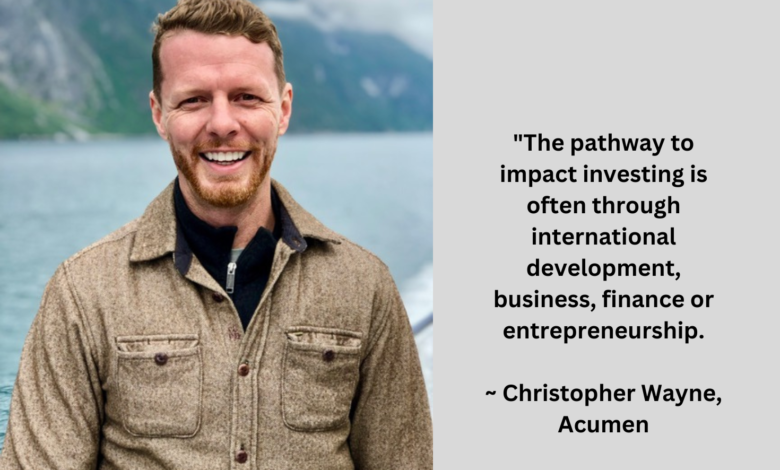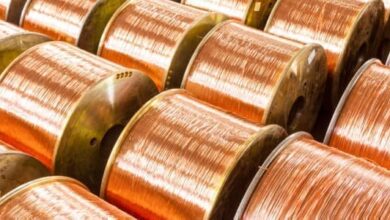Crafting a world technique for impact investment at Acumen

Agriculture and impact investing might likely likely well appear like no longer going bedfellows, nonetheless investing in sustainable agriculture is severe for addressing loads of the sector’s social and environmental challenges. In 2021, nonprofit investing firm Acumen hired Christopher Wayne, formerly of GrowNYC, as affiliate director to intention a recent world impact technique for impact-focused agriculture.
I no longer too prolonged ago linked with Wayne to learn extra about his experience at Acumen to this level. He spoke of how he made an prompt reference to colleagues at Acumen, how his sector-particular expertise outweighed his lack of a finance background and what abilities are severe to finishing up his day-to-day role.
Shannon Houde: Can you scream us what led you to originate the switch from GrowNYC to Acumen?
Christopher Wayne: Being wherever for 12 years is a prolonged time. I would been in four assorted positions and ended up in a director’s role. That became once about as excessive as I might likely likely disappear. I’d spent seven years working laborious and making a core region of programming and rising that in a formulation that I became once surely pleased with. But I became once fully ready for a substitute, to broaden my impact and leverage the details that I’d gained for a bigger platform. But after being 12 years in a single organization, I had a minute lost the flexibility to allege my abilities and sell myself. So, it became once severe for me to gaze that I had abilities that were treasured available within the market.
Houde: And now you’ve been there over a year, what are you doing day after day at Acumen?
Wayne: I spent the first year here building an agricultural technique for the organization. Acumen has been investing in agriculture for 18 years nonetheless became once buying for a recent, world technique that built off that foundation. So I spent a prolonged time digging support by our investments, pulling out insights, talking to a vast vary of assorted within and exterior stakeholders and reading rather quite lots of whitepapers and study to assemble all of it into a spreadsheet. I then feeble that to pitch assorted programs out to the C-suite and regional teams, and Acumen became once cool adequate to present me time to miss the tag a pair times and then at final surely land on a technique that’s now at the coronary heart of this recent initiative we’ve called Trellis.
Economic pattern in agriculture has three times the impact on lifting people out of poverty when in contrast to assorted sector investments.
Trellis is a $30 million investment initiative across four emerging markets that will make investments in early-stage social entrepreneurs that are fixing considerations and poverty at the center of agriculture and climate substitute. So, over the final six months I’ve shifted from a strategic workflow to a fundraising and implementation workflow.
Houde: I’m odd as to how exactly you give an explanation for this idea of agricultural investing versus impact investing? Is there a disagreement?
Wayne: In traditional, we’re exact talking about a sector-particular lens on investing. On this case, agriculture. There’s rather quite lots of assorted ways it’s likely you will likely likely well likely make investments in agriculture. You might per chance likely likely be ready to purchase land, alternate in commodities or make investments in technology that services the industry. But at Acumen, we’re particularly serious about impact investing that solves considerations of poverty, which is a theory pioneered by our founder Jacqueline Novogratz support in 2001. It’s the root of fusing the flexibleness and patience of frail support with the rigor and framework of frail financial markets. The fashion she determined to disappear about that became once by taking in philanthropic greenbacks and then reinvesting them in early-stage social entrepreneurs that were fixing considerations of poverty, creating surely innovative alternate choices to clear up among the crucial thorniest considerations on this planet.
So, on condition that there’s 500 million smallholder farmers around the sector and so that they give as much as 35 p.c of the food that we consume on this planet and straight impact the each day livelihoods of 2.5 billion people, it became once pure that agriculture would became a key pillar and focal level region for our investing. It also appears that financial pattern in agriculture has three times the impact on lifting people out of poverty when in contrast to assorted sector investments. So, the total celebrities aligned and it grew to became a terribly sure region where we wished to commit capital.
Impression investing in agriculture is set striking the impact first. In accordance with our financial return, we make certain we’re having a measurable impact return. In our case, and with this recent initiative, or no longer it’s about building climate resilience, profits enhancements and livelihood enhancements for smallholder farmers.
Houde: Are there assorted organizations like Acumen working on this at the same scale?
Wayne: Extra and extra so. Twenty years ago, there were likely seven to 10 total impact patrons. The [Global Impact Investing Network] this year counts smartly over 3,300 impact investment organizations managing bigger than $1.1 trillion. So, the dimensions of development within this house is gorgeous mammoth, and the capital under administration is rising severely. We’re seeing inconceivable commitments from companies, pattern finance institutions, foundations and philanthropists who are looking to magnify this work. The IKEA Foundation, for instance, is one of essentially the most up-to-date, largest gamers in impact investing around the sector, and we’ve developed some inconceivable partnerships with them. It’s thrilling to stare that there is a total vary of assorted stakeholders enabling this better ecosystem.
Houde: Divulge us rather bit about what you adore about your job. You clearly have rather quite lots of details and ardour.
Wayne: I work with surely cool, elegant and committed people. Even in my early interviews with the organization, I linked with the people I became once talking to. There became once a measure of idealism tempered by accurate world experience. And Jacqueline, who’s our CEO, is rather a prolific creator and heaps extra and loads of of her “Manifesto for a Ethical Revolution” seeps down into the organization and its hiring practices. It’s created a community of oldsters from whom, wherever I turn, I’m getting a fascinating idea or a push within the very finest route, or some form of collaborative abet and strengthen. I would philosophize that’s a expansive section of it.
Houde: With the dimensions you now work at, it sounds like you’ve stepped a long way from the grassroots side rather bit. Or is that aloof one thing you obtain to assemble?
Wayne: I continually believed within the U.S.model, where every person within the firm, the total fashion as much as the CEO, needed to force in a truck once a month. It’s especially critical in agriculture and pattern work where we desire to assign hyperclose to the realities of the work on the bottom. Acumen follows that formulation of pondering and has supported me to drag to our regional locations of work, where the huge majority of our investment work takes region, and spend time with investees and our regional teams, to make certain what we’re (doing) is grounded in regional context.
Acumen also developed a customer deem software called Lean Records, now operated by a spinoff called 60 decibels, which is a phone and text message-essentially based surveying service that lets in us to, within about a weeks, obtain responses from 250 or 300 tiny farmers to a region of questions that will force our technique or our investing work. That’s an extremely highly efficient software with which to assign realizing finish to the target audience that we’re intending to attend here.
Houde: What are among the crucial trends that it’s likely you will likely likely well be seeing in sustainable agriculture at the present time? Or in all likelihood you’d physique it otherwise?
Wayne: Effectively, if you happen to claim sustainable agriculture, it formulation one thing assorted to assorted people. There’s surely been a fashion against regenerative agriculture no longer too prolonged ago. For people who take dangle of organic practices, that are third-occasion certified, there’s a strongly supported and understood region of production practices there. Regenerative intends to intention on that by adding in a wider vary of agroecological outcomes, together with social parts and the human relationship with the earth, to boot to particular climate-linked outcomes, comparable to carbon sequestration.
But there’s aloof no consensus on a regenerative agriculture definition, and persons are taking it in assorted directions. There’s a community that believes inconceivable innovations in tech will scale it, and there’s one other faction that says that is an dilapidated, Indigenous originate of agriculture that wants a form of patience and intentionality that capitalism doesn’t accept the money for. I sit within the center of those two tips. I deem that tech is an extremely highly efficient enabler, nonetheless that the particular practices are steeped in 10,000 years of Indigenous practices. Indigenous communities must be resourced to lead the fashion. This is a terribly frail industry we’re talking about, and credit is attributable to those populations that had been doing this work for a terribly prolonged time. But how will we leverage tech to promote the foundations of regenerative agriculture to smallholders around the sector? That’s the important thing for me.
The impact investing house as a total is recognizing that sector-level expertise is severe for how we create our impact investing programs.
There’s now a vast focal level on food systems, which is good nonetheless, again, formulation so many varied issues to so many varied people. Extra and extra, we’re seeing this idea of “let’s consume native” and domestic food security changing into increasingly extra critical, especially if you happen to’ve got crises just like the war in Ukraine limiting fertilizer accessibility and dramatically reducing the flexibility for creating countries to access overall commodities, like grain. That continually turns the arrow support against, what are particular person countries doing to shore up our have food security and native food systems?
So, there’s loads available within the market and likewise it’s likely you will likely likely well likely no longer abet nonetheless focus on different proteins and AI and precision agriculture too. That’s where loads of the money very finest now might likely likely well be flowing.
Houde: You develop no longer come from a finance background. So how did you obtain into impact investing? What abilities assemble you utilize to sell or pitch your self?
Wayne: The pathway to impress investing is in overall by world pattern, alternate, finance or entrepreneurship. There’s rather just a few oldsters who came to it as they left finance as they were unsatisfied and wanted to employ their abilities for just. What I’ve considered extra no longer too prolonged ago is rather quite lots of hiring occurring around particular sector-level expertise. The impact investing house as a total is recognizing that that expertise is severe for how we create our impact investing programs, and that our working out of, in my case, the functional unit of a farm, became once severe to the fashion that we tried to make investments in them.
I deem I figured out a rental at Acumen as they stated we desire any individual who understands entrepreneurship, investing and pattern broadly, nonetheless who surely can lift this sector level expertise to our outdated agricultural investing and form a technique around that. They were very intentional about hiring any individual who had agricultural experience, and I deem that’s attributable to I became once ready to claim that the prolonged-period of time data I surely have in-built agriculture will be a huge return to this organization over the next 10 years.
Houde: Sooner or later, what are the abilities that are functional so that you can assemble your job smartly?
Wayne: I’m working with within and exterior stakeholders the total time. It’s a collaborative methodology across, with out anxiety, 30 assorted stakeholders internally. I prefer to administer views and insights internally, and then a total vary of exterior stakeholders who’ve engaged with our agriculture work and abet us stamp our level of differentiation. So, my capability to collaborate across within and exterior teams — lift people in, motivate them, excite them or beat support where valuable — is severe.



